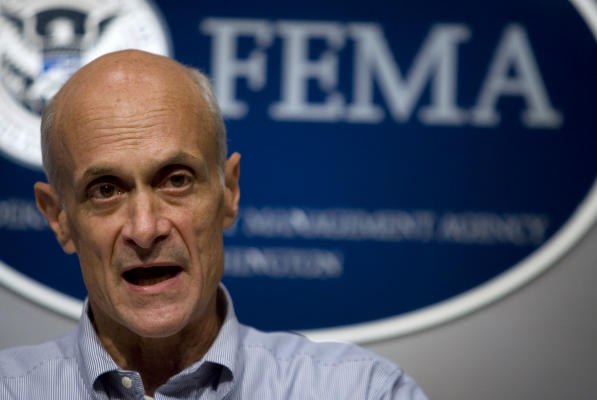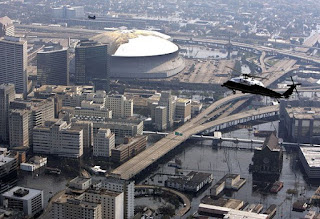Hurricane Katrina formed on 8/24/05. Katrina was the 11th tropical storm of the 2005 hurricane season, and turned westward on August 25th, toward Florida.
In the satellite image above, I have placed an arrow where we rode out Katrina here in Slidell. Just south of us is New Orleans. At 5 a.m., an hour before the storm struck land, the U.S. Army Corps of Engineers, which administers the system of levees and floodwalls in and around New Orleans, received a report that the levees of the 17th Street Canal, the city’s largest drainage canal, had been breached. East of the city, massive storm surges sent torrents of water over the levees along the Mississippi River-Gulf Outlet (MRGO) and into St. Bernard Parish, located just southeast of New Orleans.
In all, levees and floodwalls in New Orleans and surrounding areas fell in more than 50 locations during Hurricane Katrina, flooding 80 percent of the city and fully 95 percent of St. Bernard Parish.
Then Louisiana Governor Kathleen Blanco passed away in 2019 at the age of 76 from cancer. Despite partisan accusations, she did her job after Katrina. She called President Bush and asked for “everything you’ve got.”
New Orleans mayor Ray Nagin was a central figure during the aftermath. Nagin was released from federal prison in 2020, about three years before he was due to complete his 10-year prison term on corruption charges. He was found guilty on 20 counts of wire fraud, bribery and tax evasion.
But a rift had begun to open between the Republican White House and the Democratic governor. According to Michael D. Brown, the director of the Federal Emergency Management Agency at the time, Mr. Bush regarded Ms. Blanco as “totally incompetent,” while his senior adviser Karl Rove, in Mr. Brown’s view, saw an “opportunity to denigrate her for political advantage” — claims that the White House denied.

Speaking of "Brownie, you're doing a hell of a job", this assclown is now a talk show host. Now living in Denver, the 60-year-old Brown hosts a daily show on 630 KHOW, his city's radio station that is also home to shows by Glenn Beck, Sean Hannity and other fiery conservative figures. Go figure.
In the aftermath of Hurricane Katrina, then Rep. Tom Lantos, D-Calif., helped create and pass legislation for pets and animals that are and would be affected by disaster events: the Pets Evacuation and Transportation Standards Act. In 2008, Lantos declared he would leave the House due to esophageal cancer. On February 2008, Lantos passed away from esophageal cancer.
New Orleans Police superintendent Eddie Compass resigned
less than a month after Hurricane Katrina hit, amid severe criticism of police conduct, including a police killing of unarmed people on the Danziger Bridge and the cover-up of Henry Glover’s death after he was shot by a police officer. Since 2007, Compass has directed security for the state’s Recovery School District, which oversees nearly 60 schools in New Orleans, a dozen in Baton Rouge and a few in Shreveport. In a a television interview Compass said he was forced out by then Mayor Ray Nagin.
Jabbar Gibson, then 20, became famous after he commandeered a school bus in New Orleans and transported 80 people he picked up along the road to Houston. On January 9, 2006, he was arrested by New Orleans narcotics detectives and federal agents and subsequently indicted on federal charges relating to possession of cocaine, heroin, and a revolver. He was sentenced to fifteen years in prison and was released in August 2015.
Then U.S. President George W. Bush appointed Chertoff as the Secretary of Homeland Security at the start of 2005. Several months later, Chertoff and his department came under fire for their response of Hurricane Katrina. He served in his position through Bush's administration to the opening of Obama's. He is currently involved in the Chertoff Group, a consulting firm.
Russell "don't get stuck on stupid" Honore: As leader of Joint Task Force Katrina, he coordinated
military relief across the Gulf Coast after the
hurricane. The retiredlieutenant general's webpage https://generalhonore.com/ notes that he "was widely hailed by the media as the 'Category 5 General.'" He's now a business consultant, public speaker, and a senior scientist for The Gallup Organization, "working on developing questions to determine levels of preparedness." He says he's now devoting himself to "creating a 'Culture of Preparedness' in America." His book "Leadership in the New Normal" was published in 2012 by Acadian House Press.






























